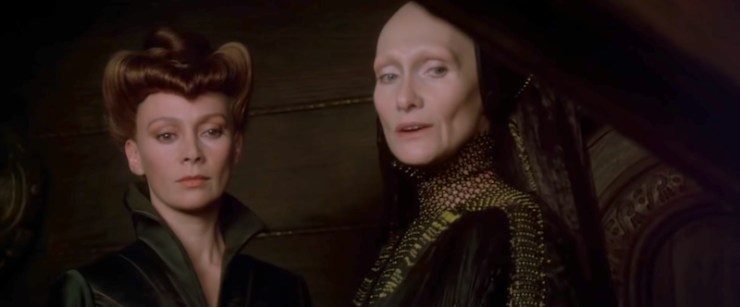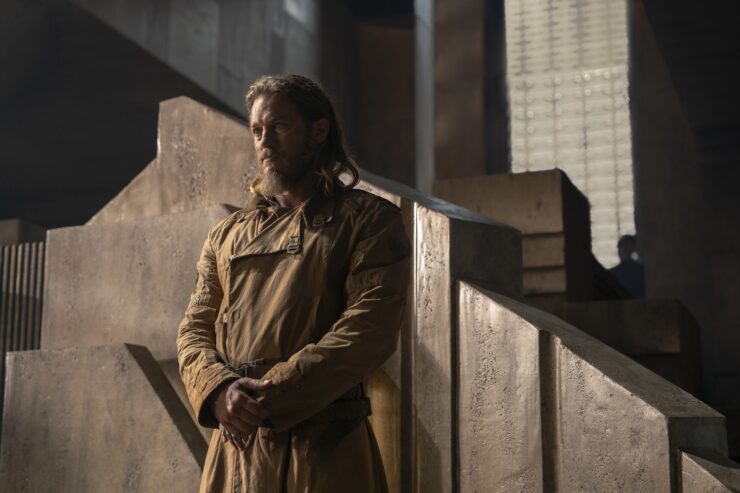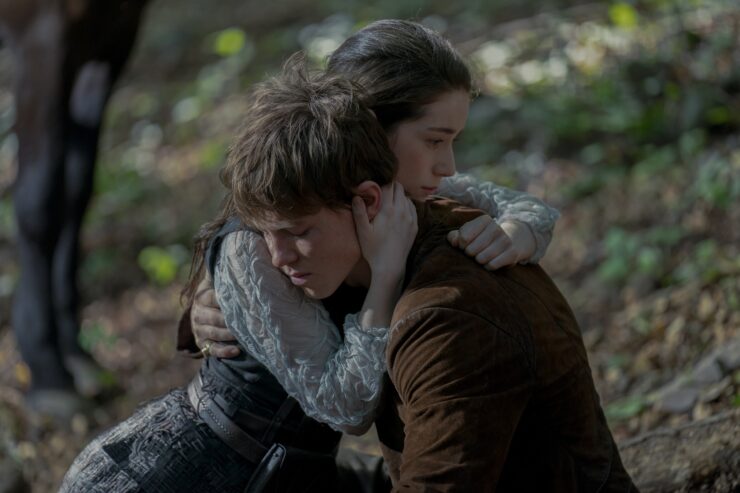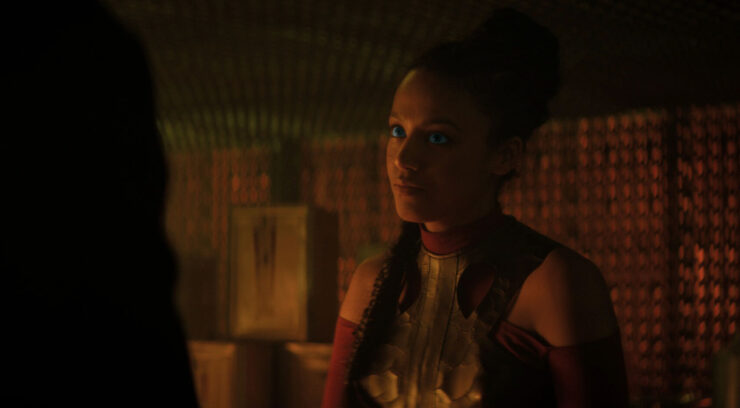Last month the news broke that the powers behind the new Dune film (coming to theaters, they say, in November 2020) were also planning a television series focusing on the Bene Gesserit. Title: Dune: The Sisterhood.
Which is fine and wonderful and grand… except:
As Tor.com’s ace media reporter Emmet Asher-Perrin observed,
This is a series about the most powerful women within the Dune universe… and the only woman involved in production so far appears to be author Frank Herbert’s granddaughter, Kim Herbert, who is representing Herbert’s estate alongside her father and cousin. Villeneuve is developing the show, and the sole writer attached is a man.
Asher-Perrin goes on to say,
Announcing projects like these with no female creatives attached never inspires a great deal of confidence. It’s 2019; we shouldn’t have to have the conversation anymore.
Indeed we should not. And yet here we are.
When I posted on Twitter about Asher-Perrin’s article and added my own observations, lots of people agreed. Inevitably, however, multiple men doggedly had to Explain To The Female On The Internet that Dune (the book) was written by a man.
So it was. And yet word on the fandom street is that Herbert’s second wife Beverly, who had given up her own writing career in order to support her husband (not by any means an uncommon situation), was not only his editor/proofreader and sounding board but also an uncredited collaborator. Furthermore, that the Bene Gesserit may have been her creation, and she in fact co-wrote Chapterhouse: Dune. There’s no way to be sure how much she contributed to the works published under her husband’s name, but that Beverly Herbert did contribute is highly likely.
It’s also totally irrelevant to the point that’s so objectionable, here: that in 2019, a television series titled “The Sisterhood” should have zero input from women writers. Why is that a problem? Why is it not a good thing for a show about women to be exclusively written and conceived by men?
Because, as I said on Twitter, a team that doesn’t think to include women writers is extremely likely not to realize what they don’t know about the lives, minds, and emotions of women. They don’t know what they don’t know. They won’t understand about the world women live in, how it’s defined by patriarchy, the compromises, the accommodations, the sacrifices. It’s not in their world view.
Look at how Hollywood portrays women in show after show, film after film. Doctors and lawyers in tight, revealing clothes while the men around them wear more loosely fitted outfits. Action heroines in low-cut necklines and tank tops when the men are in long-sleeved shirts and heavy coats. Police detectives presenting themselves for daily duty with long, loose hair, skimpy skirts, and spike heels, working beside men in plain and practical suits or jeans and running shoes.
The men are there to work. The women are there to titillate the male audience. It’s called the male gaze, and it pervades our culture.
In show after show, film after film, women exist in isolation. No female friends. One woman, gang of guys. If there is more than one woman, they’re often rivals for one of the guys. (See: Bechdel Test.) If they’re leads, they’re of prime breeding age, and course they’re highly attractive. Women over the age of forty are relegated to minor roles. Mom. Grandma. Murder victim.
Even when the show purports to offer Strong Female Role Models, they’re all too often defined by the men around them. That show that just ended, for example. It started off with multiple rapes and brutalizations of women. The ones who survived ended up in charge, for a time. But by the series finale, one had gone insane and turned into a mass murderer who had to be stabbed to death by her male lover, one had “transcended” gender and sailed off into the sunset, and the most interestingly evil character had turned into a blubbering, clinging wreck and had a rock dropped on her.
Of course one of these women did get to be Queen in the North, and one got to be Commander of the Kingsguard. But the Queen had no female friends, colleagues or advisors: they were all dead or departed. The woman knight became the sole female member of the Small Council, and in the only personal moment we see, she’s all about making sure her male lover gets his due in the annals of the Kingsguard. It’s a man’s world, and each of these characters is an isolated exception to the general lot of women in that world.
That’s what all-male writing teams tend to do when they write women. They make sure those women keep their place. Women are maidens to be either protected or brutalized, mothers to be either set on a pedestal or fridged or both, or whores to be used and abused. As characters, they are all, ultimately, defined by their relations to men.
The idea that women can exist apart from men, that they can have lives and thoughts and preoccupations that do not center on men, is not only difficult to conceive of from within a patriarchal culture—it’s threatening. It strikes right to the heart of male hegemony.
And that’s exactly why an all-male writing team is the last thing I want to see on a show about an order of powerful women whose primary mission is to control and ultimately overturn the patriarchy. A writing team that hasn’t even thought to include women behind the scenes in a show about women is all too likely to make the Bene Gesserit about men—focused on them, defined by them—when in fact, for the Bene Gesserit, men have little importance or relevance except insofar as the sisterhood manipulates them for the purposes of the order.
The Kwisatz Haderach is not about male supremacy. He’s about smashing it to smithereens.
And no, I don’t think an all-woman writing team would give us the Bene Gesserit in their full, terrible, patriarchy-shattering glory. That show would upset too many heavily entrenched applecarts and make far too many viewers uncomfortable. Hollywood at its beady little heart is all about ratings, and ratings mean catering to patriarchal assumptions.
Still. With women writers taking an active role on the team, we’re likely to get at least some sense of how women are when they’re with each other, apart from men, in an environment in which men are just not relevant. Maybe some comprehension of female friendship, women who genuinely like each other (who knew?), who get along, who work together for common goals. Who don’t drop everything to glom on to a man. Who can be strong in a way that has nothing to do with toxic masculinity, who can age without turning evil or invisible, who live lives of their own, have thoughts of their own, and aren’t constantly judging themselves by the standards of the default-male.
I don’t hold out hope for a less forced-binary future, or one that doesn’t privilege heterosexual romance—that’s not in the source material. But respect for who women are as women, rather than as male fantasies of Woman, would be a nice thing.
I might be totally wrong about this show. It could be hiring women writers even as I speak, and developing stories that respect and accurately portray the lives and experiences of women. It could happen. It’s happening with, of all things, the James Bond franchise—which has hired a woman writer, Phoebe Waller-Bridge, to clean up the script for its latest film, and has reportedly cast Lashana Lynch, a Black woman, as the new 007.
Could it happen to “The Sisterhood,” too? I suppose we can dream.
Judith Tarr’s first novel, The Isle of Glass, appeared in 1985. Her most recent novel, Dragons in the Earth, a contemporary fantasy set in Arizona, was published by Book View Café. In between, she’s written historicals and historical fantasies and epic fantasies and space operas, some of which have been published as ebooks from Book View Café. She has won the Crawford Award, and been a finalist for the World Fantasy Award and the Locus Award. She lives in Arizona with an assortment of cats, a blue-eyed dog, and a herd of Lipizzan horses.














